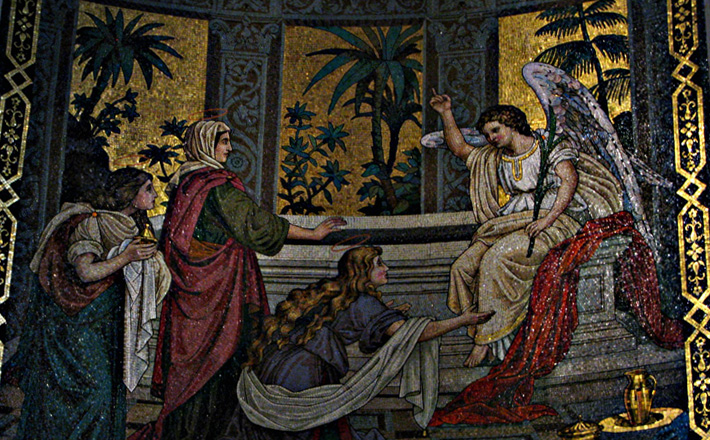Commentary on Psalm 118:1-2, 14-24
Psalm 118 has been and is an extraordinarily important psalm in the history of Judaism and Christianity.
It was Martin Luther’s favorite — “My own beloved psalm,” as he put it. Luther considered verse 17 to be “a masterpiece,” and he asserted that “all the saints have sung this verse and will continue to sing it to the end.”1
Luther’s “masterpiece” is a good place to start in appreciating and appropriating the message(s) of Psalm 118. It serves as a summary of the psalmist’s account of having been delivered from deadly threat into the renewed opportunity to live (verses 5-18), an experience for which the psalmist thanks God in what appears to be a liturgical enactment (verses 19-29; see “thanks(s)” in verses 19, 21, 28, 29, as well as in verse 1).
The prominence of thanks leads scholar to categorize Psalm 118 as a psalm of thanksgiving; but there is widespread disagreement on questions like these: Who is speaking? An ordinary worshiper? A king? And on what occasion? Is a particular deliverance in view? And if so, which? And in what setting was thanks offered? The Temple? Or are the references to “gate(s)” (verses 19-20) to be understood metaphorically? To be sure, these are interesting questions; but the possible answers are manifold, and certainty is elusive.
Thus, it seems best to return to verse 17 and to realize that its affirmation of deliverance, along with the psalmist’s commitment to serve as a witness to God’s life-giving work, would have been (and is) appropriate on the lips of many people in many times and places. If the original pray-er was an ordinary worshiper, as many scholars suggest, it is noticeable and significant that he or she describes the experience of deliverance in terms that clearly recall the exodus.
Verse 14 quotes Exodus 15:2ab, and the repeated “right hand” in verses 15-16 matches the three occurrences in Exodus 15:6, 12. Not surprisingly in this regard, Psalm 118 concludes the Egyptian Hallel (Psalms 113-118), which is used at Passover, a celebration that recalls and recounts the deliverance from Egypt.
Verse 14 is also closely related to Isaiah 12:2, which is part of a song of praise (Isaiah 12:1-6) that responds to the immediately preceding account of God’s gathering of outcasts (Isaiah 11:10-16). This connection is a reminder that Psalm 118 would have been an appropriate response to the return from exile, as well as the exodus. In this regard, verse 22 also serves as a fitting image to describe the return from Babylon and subsequent restoration (see Isaiah 28:16; Jeremiah 51:26).
Christian readers are accustomed to hearing verse 22 in connection with Jesus’ rejection and crucifixion, followed by Jesus’ resurrection (see Matthew 21:42; Luke 20:17; Acts 4:11-12). This is not to say that Psalm 118 should be understood as a prediction of Jesus. Rather, the New Testament citations of verse 22 are evidence that the early Christians understood that God’s life-giving work was continuing in the Christ-event.
The liturgical use of Psalm 118 during the seasons of Lent and Easter is instructive. Psalm 118 is the Psalter lection for both Palm/Passion Sunday (compare Psalm 118:25-27 with Matthew 21:9; Mark 11:9; Luke 23:38; John 12:13) and Easter.
The effect is not only to hold cross and resurrection inseparably together, but also to affirm that Jesus’ death and resurrection are life-giving events in continuity with the exodus and restoration from exile. God was, and is, the God who gives life amid the threat and the reality of death.
Verse 24 concludes the Easter lection, and its affirmation is crucial. The NRSV is familiar: “This is the day that the LORD has made.” But the CEB offers a helpful alternative: “This is the day the LORD acted.” Throughout its history, this verse has been capable of affirming God’s life-giving power and action in …
… the deliverance of enslaved Israelites from Pharoah’s deadly power.
… the return of dispirited exiles from Babylon.
… the resurrection of Jesus.
… the lives of ordinary folk who trust and affirm that life (and all that sustains life) is not merely a human achievement, but rather a gift from God.
For Christians, Easter is the quintessential, paradigmatic instance of “the day the LORD acted.”
In their description of Psalm 118, Hossfeld and Zenger conclude that it is “a liturgical cantata with an instructional purpose.” At the heart of what Psalm 118 teaches is that “God is ‘good,’ that is, life — promoting, and that his ‘love,’ that is, his mercy endures forever [see verses 1-4].” Thus, Psalm 118 “invites [the reader] to a liturgical celebration of this divine reality, and to allowing oneself to be transformed by it.”2
Hossfeld and Zenger’s description of Psalm 118 helps us to appreciate why it is so appropriate for Easter. Like Psalm 118, Easter is a liturgical celebration “with an instructional purpose.” Easter teaches us that God is essentially “life-promoting,” because God is fundamentally loving and merciful. And so Easter, like Psalm 118, invites transformation!
What a difference it would make if we were to view our lives and livelihoods not as something we achieve (note our preoccupation with “making a living”), but rather as a gift we receive. The pervasive greed and acquisitiveness of our North American culture might be replaced by radical gratitude. The dogged attempt to build up our own reputations and fortunes might be replaced by a commitment to “declare what the LORD has done” (verse 17) and how “the LORD acted” (verse 24, CEB).
The stress and strain of vain striving might be replaced by true joy and celebration (verse 24). As a response to the life-promoting divine power and action that we celebrate on Easter, Psalm 118:1 is a wonderful place to start: “O give thanks to the LORD, for he is good; his steadfast love endures forever!”
Notes:
1 Quoted from Luther’s Works, Vol. 14: Selected Psalms III, by Ronald M. Hals, “Psalm 118,” Interpretation 37 (1983);277, 280.
2 Frank-Lothar Hossfeld and Erich Zenger, Psalms 3: A Commentary on Psalms 101-150 (Hermeneia; Minneapolis: Fortress Press, 2011), 232, 246.


April 20, 2014